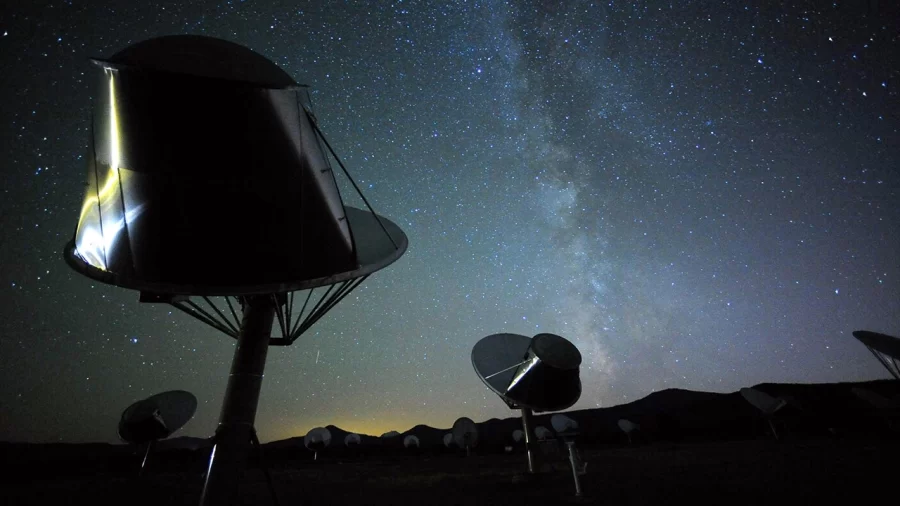Finding Intelligent Life in Space
Hey aliens... are you listening?
February 18, 2023
Are we alone?
Simply confirming that we are not the only lifeforms in our universe would shed light on the greater mysteries troubling humanity, but even beginning to answer this question is proving more difficult than scientists had perceived.
A recent study showed that 65% of Americans believe in intelligent life outside Earth. Even more believe that simple, non-intelligent life exists. And why would they not? After all, humans exist, and to quote Stephen Hawking, “We are just a slightly advanced breed of monkeys on a minor planet orbiting an average star.”
He’s right. In fact, 1 in 5 stars contains a potentially habitable exoplanet (habitable in the sense that it contains liquid water and is comparable in mass to Earth). There are over 100 billion stars in our galaxy, and there are billions upon billions of galaxies in our universe. If this “minor planet” and “average star” could nurture life, why could other areas in the universe not?
It is an exciting prospect. In contrast to other areas of study, this conversation is one the public is often involved in simply because it doesn’t necessarily require complex mathematics to understand. While this is encouraging information for most, it has actively turned the field of astrobiology into a realm flooded with misinformation. For this reason, we have begun to lose sight of the true meaning of science—that being exploration and discovery of our universe—and have, instead, converted the beauties of these studies into a tool of personal use.
In the public’s eyes, there are two answers to the question posed earlier: aliens either exist or they don’t. The latter opinion is the one that often hinders scientists’ search for life. This is the result of a law deeply embedded in our politics: if people don’t believe in your cause, they won’t fund it. And research into “are we alone” can be immensely costly. Indeed, we need look no further than Mars to see this. The perseverance rover designed for astrobiology research costs a whopping 2.4 billion dollars. If the statistical likelihood of extraterrestrial life is not recognized by the mass majority, we may never receive the necessary funding and so never get an answer to our question.
Additionally, conferences that simply convince people that aliens exist can cost thousands of dollars. Everything from the venue, hours required, equipment, and speaker represents expenditures to any sort of public conference. So instead of brilliant minds, money, and time spent searching for extraterrestrials, it is spent in the futile endeavor to change the minds of many who arrived at the event with no intention of altering their preconceived notions. This is where science loses some of its indescribable pleasure. Because instead of making exploration and discovery its chief aim, scientists must battle with the public to simply inform them that microbial life on distant exoplanets is not the same as vampires from Twilight. Some scientists have stopped arguing about this with the public entirely because it has evolved into something that is, frankly, beneath them.
So now what? Will ignorance reign supreme?
We must educate ourselves on the infinite prospects our universe holds. Go outside tonight, peer into the cosmos, inquire as to whether we are alone, and pray there is another extraterrestrial civilization, looking back at you, asking the same question.
